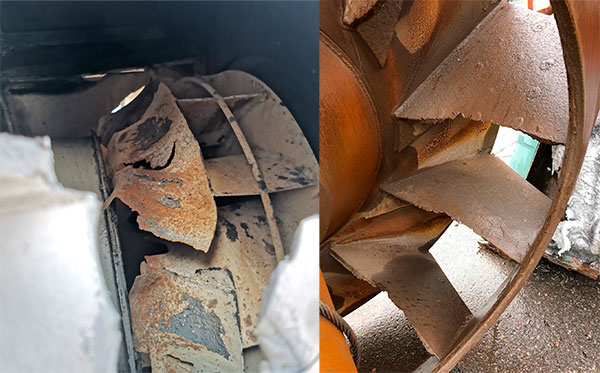Industrial fans: two causes of failure you can’t intercept with vibration analysis
Predictive maintenance and vibration analysis have made huge advances in recent years, making technicians almost clairvoyants who can identify the cause of a future failure without even disassembling the fan. However, there are applications for which impeller failure comes almost without warning, especially if only the vibrations on the bearings are monitored. These cases can be traced to two different causes even though the underlying principle is the same: the progressive reduction in the thickness of the sheet metal from which the impeller is constructed.
In fact, the mechanical strength of a fan’s impeller depends both on the material chosen for its construction and on the thicknesses used.
In almost all industrial applications, the thickness of the metal sheets remains constant over time and therefore no structural problems occur.

However, when the fan carries a fluid that can progressively “consume” the impeller material, sooner or later a critical threshold will be exceeded beyond which mechanical strength is no longer guaranteed. This continuous reduction in thickness occurs rather evenly over all the blades, without causing appreciable imbalances, and so observing the vibrations of the fan, it seems that every thing is functioning normally.
What, then, are the two causes of progressive fan impeller wear ?
Abrasion due to hard solid particles, such as metal dust, aggregates, or even ash and waste from rice processing, can wear out the material from which an impeller is made very quickly, especially if common carbon steels with low surface hardness are used.
Similarly, corrosion due to condensation from water vapor or other substances with strong chemical aggression (basic or acidic) are able to reduce the thicknesses of impeller blades and disks very quickly, especially if the condensation is in the form of larger or smaller droplets .
Mass-produced fans purchased from a catalog have a very short life in this type of application, being made of common steels with little resistance to both abrasion and corrosion.
If, therefore, it is not possible from a process point of view to eliminate the presence of abrasive and/or corrosive substances, in order to ensure the proper and long operation of the system it is necessary to use fans designed and built specifically for this type of application, such as those that we at PBN have been designing for over 45 years for our customers .















